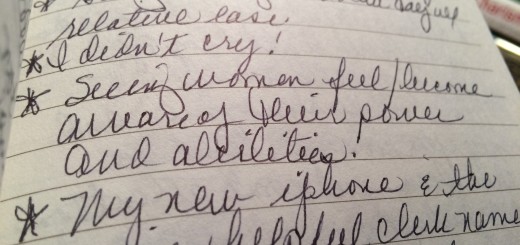7 Ways To Move Through Grief: Emotional Support
Article #1 in a series of 7
 Going through loss, moving through grief… it’s an inescapable part of the human experience.
Going through loss, moving through grief… it’s an inescapable part of the human experience.
The first loved one I ever lost was when I was a little girl. Faye was a family friend, a sweet and lovely young woman whose life was cut short tragically in a car accident.
Like we all do, I experienced other losses as time went on – saying goodbye to friends when moving to a new city, breaking up with a boyfriend, losing a job, more deaths of loved ones – but the loss that hit me this year was the most deeply felt to date. The loss of my marriage. It was a relationship that had spanned 30 years because my ex-husband and I had been friends before we became romantically involved. We started dating in 1986, tied the knot in 1988, and gave birth to our awesome daughter in 1993. He decided he wanted out, and we divorced this past August.
How the heck did this happen? Honestly, I could try to understand it the rest of my days and not really know the answer to that question. But what I do know is that divorce sucks. Loss is awful. And no matter what you think you know about life – no matter how much you’ve grown in knowledge and wisdom – you still have to move through grief. You can’t skip the steps.
Ways To Move Through The Grief
A friend who lost her husband to cancer last year cautioned me about numbing and self-medicating while you’re grieving. She said it doesn’t really work in the long run. She’s right. Might as well face your grief head on and try to move through it as consciously and gracefully as possible.
So, that’s what I decided to do – to not only face my pain, but to actually welcome every angry tantrum, every teary-eyed feeling, and every sad thought that came to the surface with open arms. I allowed myself to have those thoughts and feelings and listen to what they needed to tell me. Then I either put them into perspective and released them, or I filed them into the category I call “forgive/release this later when ready.”
Knowing this would involve a lot of heavy lifting (and it has!), I promised myself that I would take supportive measures. I tuned into my intuition and asked myself, “What do I need?” After practicing the skill of listening to my intuition for many years, I’ve learned it’s never wrong. So, I listened and did what occurred to me as it occurred to me.
In hindsight, I can see that there were seven things that specifically helped me move through my grief so that I could emerge strong, healthy, and ready for the next chapter:
1. Emotional Support
2. Gratitude
3. Journaling
4. Distractions
5. Structure
6. Future Focus
7. Physical Activity
Emotional Support – Friends and Family
Everything on this list is important, but the first one, Emotional Support, was especially crucial. Although I’m not the type of person whose first thought is to ask for help, especially being such a private person, I knew it was necessary. Because of my work advising people who experience job loss, I know about the power of emotional support from friends and family. So I turned to the circle of loving people in my life.
It was difficult to talk about my situation and to ask for support, but I’m so glad I did! Some people gave me positive thoughts, prayers, encouragement, and advice; some donated furnishings and household items I needed for my new place; and some even physically helped me move. Most of all, I appreciated the love I felt from each one of them whenever we exchanged a text, an email or a phone call.
By the way, they helped me save money too. If it hadn’t been for these wonderful people, I would have had to spend a lot more than I did on things like attorney fees, stuff to set up my new household, and moving costs. And I was able to avoid therapy bills because certain individuals (you know who you are!) let me talk my head off when I really needed to!
Emotional Support – Meditation/Prayer
Emotional Support comes in other ways besides the people who care about you. For me, it included a reliance on my faith, specifically through my meditation and prayer intentions. I’ve learned that things always work out for the best when you set the intention and then take the necessary actions to do what is in the best interests of all concerned.
Also, when you live long enough, life gives you experiences that you survive and thrive through. Those experiences become evidence which increases your faith that “this too shall pass” and that “God’s got it.”
I meditated/prayed, calming myself and feeling emotional support in the act, while at the same time asking that I be shown evidence of Divine presence in the dissolution of my marriage. I had faith, but not blind faith. I looked for proof, and my RAS showed me the signs of Divine presence. And I’ve been able to see how things were working out in the best interests of all concerned since day one. I haven’t felt alone, and that has helped tremendously.
Emotional Support – My Dog
There’s something about having a dog companion that is emotionally supportive no matter what you’re going through, but particularly during the rough patches in your life.
My dog, Paddy, is very sweet and gentle. There’s mutual affection and acceptance between us. He shows me that whatever’s going on, we can adapt – we can roll with it.
I think that’s mostly because it’s dog nature to live in the moment. For him the past is over and done. What happened yesterday or even an hour ago soon becomes insignificant and forgotten because it’s all about what has his attention right now.
“What’s a past?” he might ask if he could talk. “Hey, want to go for a walk and explore this new place where we live now? How about a nap? Whatever you want to do, I’m happy.”
Next Up – Gratitude
In part two of this series I’ll share how I used Gratitude as a way to move through grief. I know it sounds like an odd concept – practicing gratitude while trying to process loss – but it’s not what you think. I wasn’t grateful for the divorce… although some people keep assuring me that one day when I look back on my ex-husband’s decision that I’ll feel that way! But I did use gratitude to help with my attitude, to cope with and balance my emotions, and to deal with the mundane, day-to-day stuff that didn’t stop happening just because my life had been suddenly turned upside down.
Click HERE to read part two, 7 Ways To Move Through Grief: Gratitude.
__________________________________________________________
Angela Loeb is into self-development… and she helps people bring who they really are to what they do.
More at http://angelaloeb.com
__________________________________________________________




